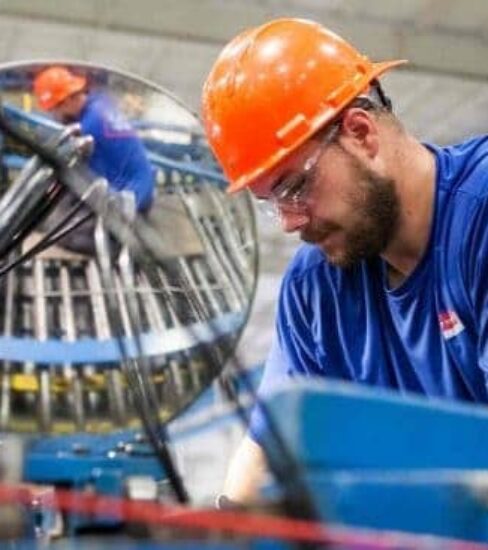As digitization continues to make its way into every conceivable corner of the business world, manufacturers aren’t immune to the fast-growing trend. Driven by changing customer expectations and the surge in customer demands, and the accelerated pace of innovation, today’s manufacturers need to adapt – and fast, or risk being left behind. To maintain business continuity, boost efficiency and productivity, and run smarter, more efficient production processes, manufacturers large and small, are turning their attention to business management systems, such as ERP, to automate their workflows, meet delivery schedules on time, and budget.
While that’s all well and good, for now, what about future ERP systems? Will they be able to effectively support production planning, documentation and reporting, logistics, and more, to drive the supply chain (and the end product), to the customer’s door? In other words, how can today’s ERP systems be primed, ready, and flexible enough to support agile manufacturing?
Let’s take a look at what powers agile production processes, and just how agile and ‘flexible’ manufacturing ERP software needs to be to survive the next big digital wave.
What are the Manufactures "aches and pains"?
If you’re a manufacturer or perhaps a key stakeholder in the supply chain, you’re well aware of the long list of proverbial ‘pain points’ that keep production plant owners awake at night. Fueled by the unprecedented changes resulting from the pandemic, today’s manufacturers are faced with constant supply chain disruptions. From materials and labor shortages, automation challenges, order backlogs, and competitive pricing, to new mandates in shipping and logistics and ever-changing regulations and compliance, the list is downright exhausting.
The average manufacturing plant, whether it churns out running shoes or horizontal stabilizers, often relies on a portfolio of hundreds of legacy standalone software applications. Some are proprietary, developed in-house to perform a specific function, while others may lack the required documentation. Other apps may be back-office only or running on unsupported operating systems. This eclectic mix of siloed apps is costly to maintain and update, putting production continuity, quality, and safety at risk.
The advent of even greater cutting-edge applications, namely 5G, will increase the challenge of running disparate solutions even further, and will grow exponentially for large manufacturers operating dozens or hundreds of individual plants. Case in point – If your business is agile, your ERP should be, too. Read on.
Agile Manufacturing & Industry 4.0 : is your ERP up for the challenge?
Agile manufacturing is more than just a catchphrase, it’s a mindset. It’s an approach a manufacturing company takes to produce products based on an agile manufacturing strategy companywide. This is achieved by integrating production processes, tools and training to enable manufacturers to respond quickly to customer needs and market changes, without jeopardizing product cost and quality.
Enter Industry 4.0. Over a decade ago, it called for a future of agile and affordable manufacturing processes connecting IoT, 3D printing, cloud computing, mobile devices, and big data. While it’s still a tall order for many organizations, it did shine a light on the inflexibility of many manufacturers’ operations, leaving them little choice but to change. With the help of Industry 4.0 and smart manufacturing initiatives, manufacturers, albeit, many at a snail’s pace, learned to embrace digital transformation. New technologies, such as cloud, AI and edge computing, which have completely changed the IT landscape, have accelerated production workflows. Still, Industry 4.0’s full potential has yet to be realized, as manufacturers continue to struggle to scale these advances throughout their operations.
For the multitude of manufacturers out there already (happily) using an ERP system to manage and control their operational and business processes, and for those who are looking to replace their legacy applications, know this: Agile manufacturing processes cannot stand alone. They must be supported by an agile ERP.
By leveraging an agile, open and flexible ERP’s intelligent, automated workflows, BI tools, smarter asset management, and real-time business insights powered by data and AI, manufacturers can and will save valuable time, resources, and costs. An agile ERP enables manufacturers to quickly identify defects and take corrective actions, reduce material waste, maintain healthier assets, run leaner, more streamlined processes, satisfy shareholder and employee expectations, and meet the latest regulatory and industry requirements – all on a single platform.
Today, competitive dynamics and the pace of change are so quick, that most companies don’t know what their business model will be in the next 2-3 years. Manufacturers need an ERP system that is designed to incorporate business agility and scalability, so they can change their business as they see fit, without changing their platform.
Trade in or trade up: When should you bid farewell to your legacy systems?
The 4th Industrial Revolution is all about digital, and all about the here and now – smart factories equipped with AI robotics, data analytics, smart sensors, advanced automation, and advanced human-to-machine interfaces. It’s about powering the end-to-end manufacturing process that transforms factories into smart environments, increasing interoperability between machines, logistics systems, and where work-in-process components on the shop floor can deliver real-time data to both back-end and monitoring systems.
Smart environments also drive real-time communication between multiple stakeholders, from suppliers, to customers, and employees. The result? Increased productivity, efficiency and quality in processes, greater workforce safety by reducing jobs in dangerous environments, enhanced decision-making with data-based tools, and improved competitiveness by developing customized products.
To onboard and support a multitude of digital processes, vast amount of data from various sources, and easily integrate third-party products and applications, an ERP system will have to become the backbone that, in a word, holds it all together – connecting smart machines on the shop floor, powering AI-driven sensors, where billions of sensors are embedded into the environment to collect critical production data, and being able to aggregate, store, analyze, and share reams of new types of data.
There will be a sizable expectation of future ERP systems to go far beyond agile manufacturing and the smart factory, to be fully integrated with manufacturing execution systems (MES), essentially tracking and tracing every component, from cradle to grave. Next-generation ERPs must also offer robust planning functionality, and integrate analytics and machine learning into the mix, to support the next step, the move towards intelligent manufacturing.
Does your current manufacturing ERP have the necessary IT infrastructure, and the breadth and functionality of automated digital tools to power your production processes and keep up with this new paradigm? If the answer is no, there are viable solutions out there that address the real needs of growing manufacturing organizations – a hyper-connected ERP with a new level of interoperability between core business processes, external data, and IoT devices.
An agile ERP for an agile business world
Priority ERP helps manufacturing organizations to embed data insights into their business processes, identify and analyze manufacturing performance, automate procurement transactions, increase financial margins, and manage suppliers, capital, and risks, and use data to optimize processes, enhance supply chain agility, and better serve the modern customer. Built for today’s manufacturers, Priority ERP is a highly scalable system, designed to keep pace with an organization’s trajectory, with the ability to take on new markets and handle exponential increases in transactional volume, workloads, and amounts of data.
Priority serves an extensive range of manufacturing customers around the globe, including medical devices, electronics, software & technology, pharmaceuticals, retail, and many others. One such customer, Trutex, the UK’s oldest and largest independent schoolwear manufacturers, first implemented Priority ERP in 2006, replacing their legacy standalone solutions with Priority, and consolidate their operational processes on a single platform. Trutex integrated Priority ERP company-wide, to automate and streamline stock control, stock forecasting, order fulfillment, procurement planning, warehouse management (WMS), and manufacturing processes, including managing their distribution center, shipping directly to customers’ shelves.
“We support three diverse sales channels, with different systems for wholesale, online, and retail, but only one pool of stock, making it nearly impossible to forecast demand and manage stock levels, resulting in overstocking in some areas, and shortfall in others,” said John Hogan, Group Supply Chain Director at Trutex. “Priority helped us simplify our complex processes, with better visibility of demand, and minimizing stock movements from our global factories, by moving stock only when needed. Tighter inventory control and demand forecasting helped us efficiently price our products, resulting in significant cost savings.”
When it comes the time to implement a new ERP in your manufacturing organization, or replace your current ERP system, Priority supports the next revolution in manufacturing and manufacturing management, setting the stage for true agile manufacturing processes, all powered by IoT, AI and advanced robotics, with a dedicated REST API, and a wide variety of innovative tools.
The future of ERP? With Priority ERP, the future is already here.


